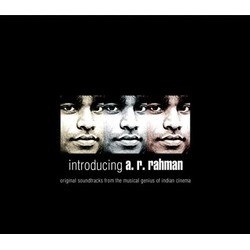Introducing A.R. Rahman
¡Subscríbete!
¡Manténgase informado y obtener mejor acceso a la información de los coleccionistas!
¡Manténgase informado y obtener mejor acceso a la información de los coleccionistas!
| # | Pista | Duración | |
|---|---|---|---|
| 1. | Bombay Theme Music | 5:15 | |
| 2. | Chinna Chinna Aasai | 4:55 | |
| 3. | Kannaalaney | 5:52 | |
| 4. | Mettuppodu | 6:50 | |
| 5. | Ennavale Adi Ennavaley | 5:12 | |
| 6. | Anbe Anbe | 5:32 | |
| 7. | Rasika | 7:07 | |
| 8. | Yaro Yarodi | 5:44 | |
| 9. | Maargazhi | 6:58 | |
| 10. | Swasamae | 5:49 | |
| 11. | Thirakkaatha | 7:10 | |
| 12. | Minsara Kanna | 6:15 | |
| 72:39 |
| # | Pista | Duración | |
|---|---|---|---|
| 1. | Alai Payuthey | 3:42 | |
| 2. | Varaaga Nathi | 6:19 | |
| 3. | Idhu Manmatha Maaham | 4:47 | |
| 4. | Sowkkiyamma | 5:55 | |
| 5. | Thom Karuvil Irunthom | 5:37 | |
| 6. | Kannodu | 5:10 | |
| 7. | Uyire Uyire | 7:16 | |
| 8. | Kulichaa Kutthalam | 4:48 | |
| 9. | Anbendra | 3:37 | |
| 10. | Kannamuchi | 5:11 | |
| 11. | Usilampatti Penkutti | 4:40 | |
| 12. | Poraalae 2 | 6:21 | |
| 13. | Nthiyae Nathiyae (Water) | 6:52 | |
| 70:15 |
In common with compilations of prolific film composers in general, this two-CD collection -- as lengthy as it is -- is a necessarily selective overview of some of A.R. Rahman's work. With 24 tracks and more than two hours of music, it includes excerpts from soundtracks spanning 1993-2001, most of the selections containing vocals. Whether intentionally or by design, the net effect of this particular grouping of tracks is not to establish an identifiable style, but to demonstrate Rahman's versatility. Working in contrast to the stereotypes many viewers have of the flashy, sometimes cheesy music heard in much Indian cinema, the material here is thoughtfully assembled and dignified, though it does make frequent use of melismatic and female upper-range vocal styles not often heard in Western popular music. Too, there are combinations of Indian compositional and instrumental forms with up-to-date modern production touches, such as the train whistles, dramatic percussion, and looped-sounding singing that punctuate 'Idhu Manmatha Maadham.' The thick beats and bottom of 'Kulichaa Kutthalam' draw from club/dance sounds, and 'Anbendra' from the kind of orchestral sweep found in many soundtracks throughout the globe. Other tracks, however, can make use of more traditional elements, like the sitar and chanting in 'Sowkkiyamma' and the flutes that pace 'Ennavale Adi Ennavaley,' though it's not long before bells and bee-buzzing vocals take that piece out of old-fashioned territory. All of the material is taken from soundtracks performed in the original Tamil language, Rahman's native tongue.

